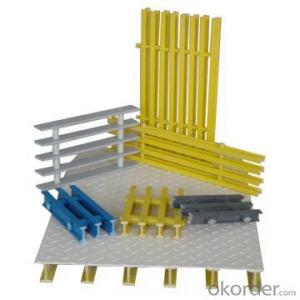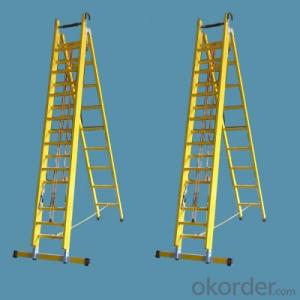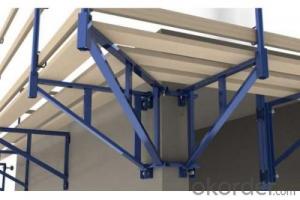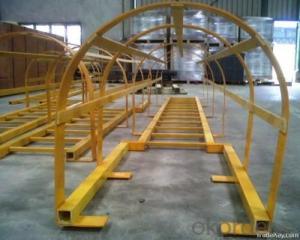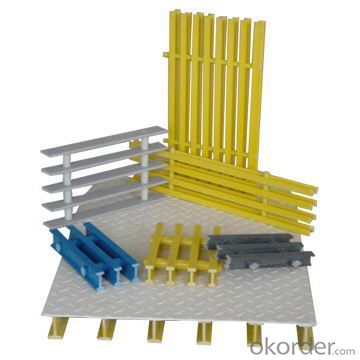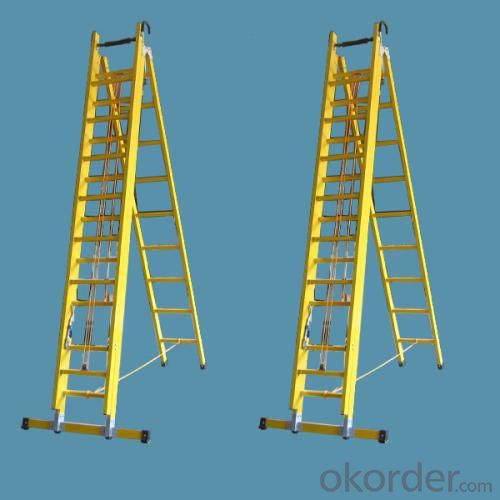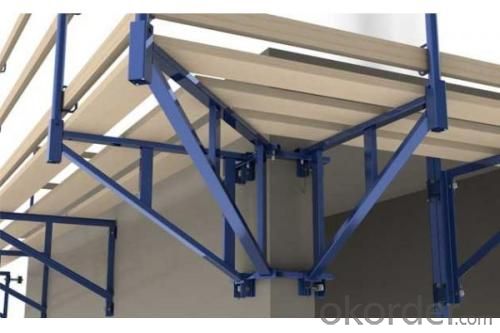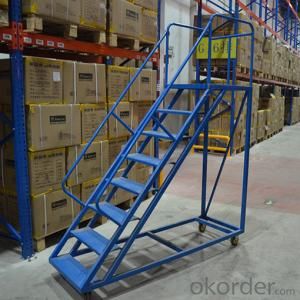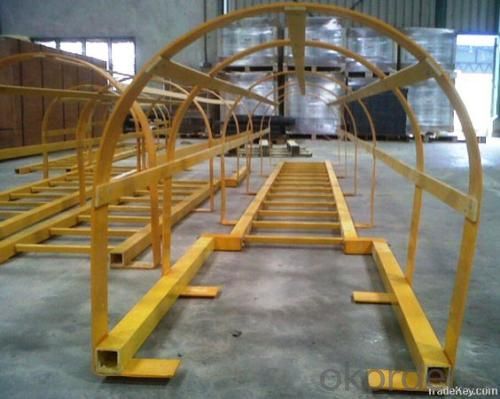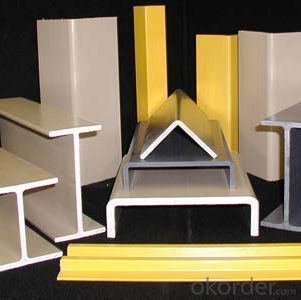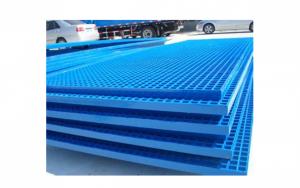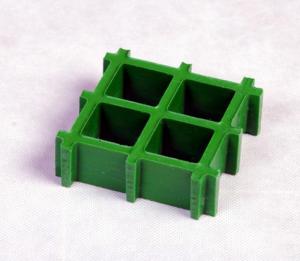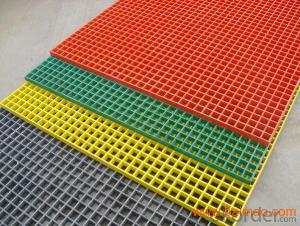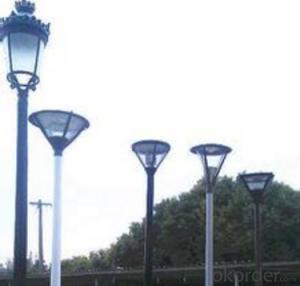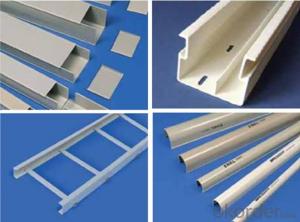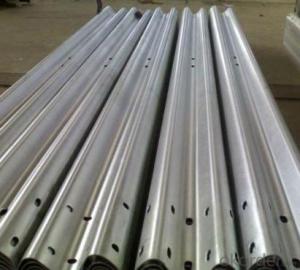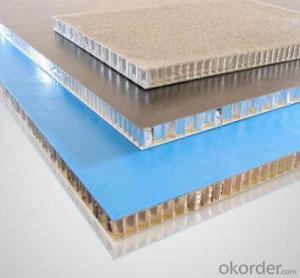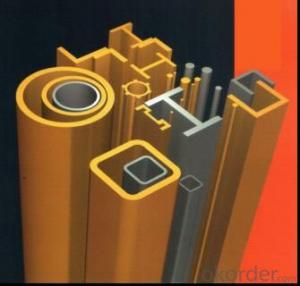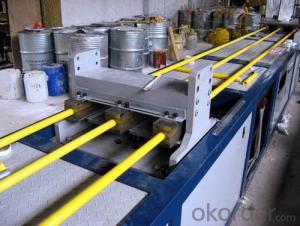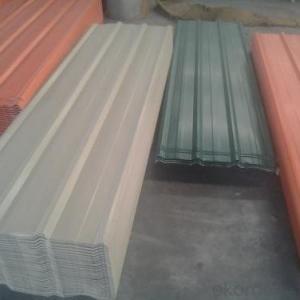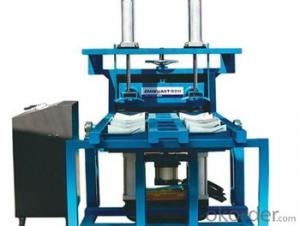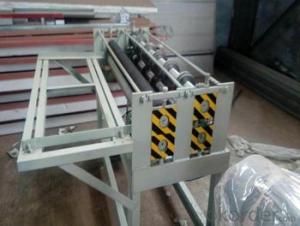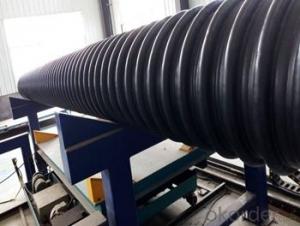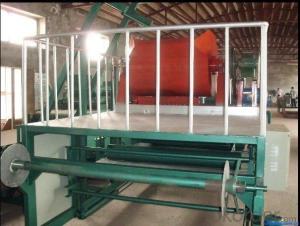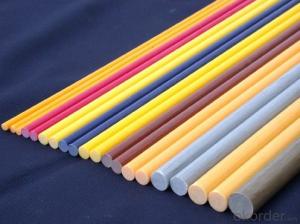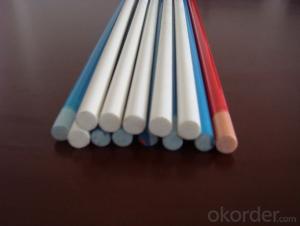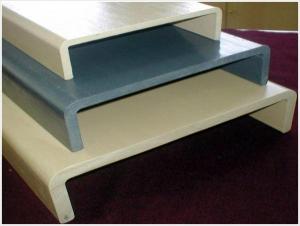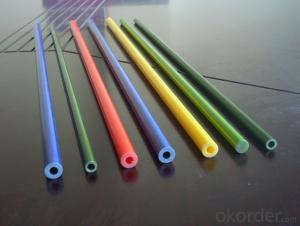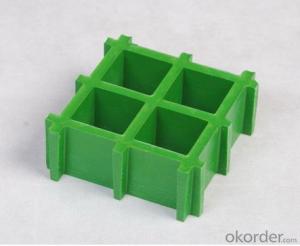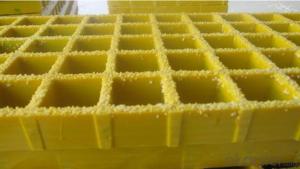FRP Pultrusion Profiles - Pultruded Grating with Weathering Resistance and Toxic-Free Sales
- Loading Port:
- Tianjin
- Payment Terms:
- TT OR LC
- Min Order Qty:
- 1 m.t.
- Supply Capability:
- 1000000 m.t./month
OKorder Service Pledge
OKorder Financial Service
You Might Also Like
FRP PULTRUDED GRATING AND PULTRUSION PROCESS
PRODUCT DESCRIPTION
Pultruded grating is made by a particular assembly process, which using “I” shape as its main load-bearing and special rod to go through the bearing bar. Pultruded grating include the standard grating and the custom grating, the custom grating can be designed to meet customer’s requirement or special using condition by changing the shape, size and space of the bearing bars, the surface can be covered with lozenge panel, grit panel, or added the anti-slippery sand directly.
SPECIFICATION
The standard space between two crossbars is 6 inch or 12 inch.
Thickness (mm) | Bar width (mm) | Open space (mm) | Open rate (%) | Approx weight (kg/m |
25.4 | 15.2 | 22.8 | 60 | 13.2 |
25.4 | 15.2 | 15.2 | 50 | 15.9 |
25.4 | 15.2 | 10.1 | 40 | 18.5 |
25.4 | 40 | 10.8 | 21 | 14.5 |
38.1 | 15.2 | 22.8 | 60 | 15.8 |
38.1 | 15.2 | 15.2 | 50 | 19.1 |
38.1 | 15.2 | 10.1 | 40 | 22.4 |
50.8 | 25.4 | 25.4 | 50 | 16.6 |
50.8 | 25.4 | 12.7 | 33 | 21.1 |
CHOICE FOR PULTRUDED GRATING
Resin: GP resin, ISO resin, VE resin, Phenol resin
Color choice: Yellow, gray, green, custom color
Surface choice: Groove surface, grit surface, lozenge cover surface
FEATURES
a. Anti-corrosion and anti-rust
b. Light weight and high strength
c. Anti-flammable
d. Anti- fatigue
e. Safe and anti-slippery
f. Anti-ageing
g. Easy of maintenance
h. Excellent electromagnetism property
i. Good economic benefit
FIELDS SERVED
Sewage treatment,
water supply and drainage,
chemical industry,
oil industry,
power engineering,
pulp and paper,
construction engineering,
spinning, marine engineering.
COMPANT DESCRIPTION
CNBM International Corporation is one subsidiary of CNBM, we focus on offering good-quality products,professional service and complete solution to our customers. Strong delivery capacity, advanced technology& management, strong financing capability and excellent after-sale service are our advantages in sharing international market.
FAQ
1.Q:Are you factory or trading company ?
A:We are Factory produce FRP machines and FRP products.
2.Q:If can customized by customers requirements?
A:yes,we can produce the machine with customized size.
3.Q:How about the payment?
A:We accept any kind of payment.
4.Q:What is the guarantee?
A:Gurantee is one year.
5.Q:If you can training?
A:yes ,we can training in our factory also can send engineers to your factory training.
PICTURES
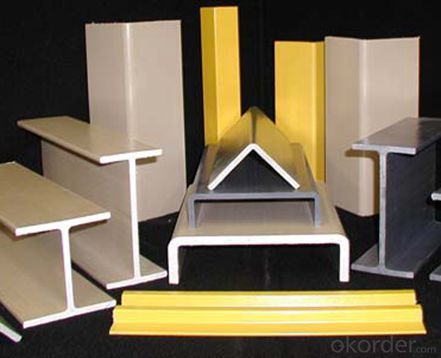
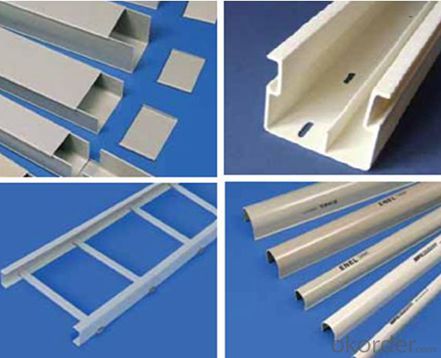
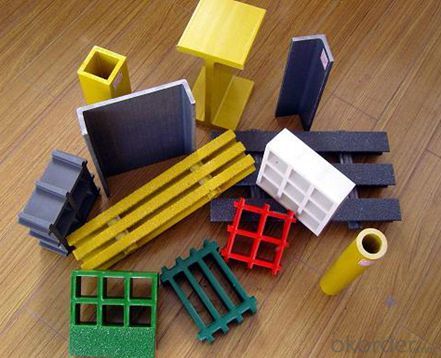
- Q: Are FRP pultrusion profiles resistant to moisture or humidity?
- Yes, FRP (Fiber Reinforced Polymer) pultrusion profiles are highly resistant to moisture and humidity. The pultrusion process involves impregnating continuous fibers with a polymer resin, resulting in a strong and durable composite material. This composite is inherently moisture-resistant and does not absorb water like traditional materials such as wood or metal. Additionally, FRP pultrusion profiles have a low coefficient of thermal expansion, meaning they are less likely to expand or contract under varying levels of humidity. This resistance to moisture and humidity makes FRP pultrusion profiles suitable for a wide range of applications, including outdoor structures, marine environments, and other moisture-prone areas.
- Q: Are FRP pultrusion profiles resistant to chemicals used in oil refineries?
- FRP pultrusion profiles have a high resistance to chemicals utilized in oil refineries. These profiles consist of a combination of strong fibers (such as fiberglass, carbon fibers, or aramid fibers) embedded in a polymer resin matrix. This unique construction grants them exceptional resistance to various chemicals commonly found in oil refineries. The polymer resin matrix used in FRP profiles can be carefully chosen to withstand harsh chemical environments. For oil refinery applications, vinyl ester or epoxy resins are often employed due to their superior chemical resistance properties. Additionally, FRP pultrusion profiles are inherently corrosion-resistant, unlike traditional materials like steel or concrete that deteriorate when exposed to aggressive chemicals found in oil refineries. This corrosion resistance ensures the long-term durability and reliability of FRP profiles in such environments. Furthermore, FRP profiles offer several other advantages in oil refinery applications, including a high strength-to-weight ratio, electrical insulation, non-magnetic properties, and ease of installation. These characteristics make FRP pultrusion profiles an ideal choice for various structural, piping, and equipment applications within oil refineries. However, it is crucial to consider the specific chemicals and concentrations involved in a particular oil refinery application. While FRP profiles generally exhibit excellent resistance to a wide range of chemicals, there may be highly concentrated or specialized chemicals that could potentially impact their performance. In such cases, it is advisable to seek guidance from FRP manufacturers or experts who can offer tailored solutions to meet the specific chemical resistance requirements of the oil refinery.
- Q: Are FRP pultrusion profiles resistant to hydrocarbons?
- Yes, FRP (Fiber Reinforced Polymer) pultrusion profiles are generally resistant to hydrocarbons due to their inherent corrosion resistance properties. The composite materials used in FRP profiles provide excellent resistance to various chemicals, including hydrocarbons, making them suitable for applications in industries where exposure to such substances is common.
- Q: Can FRP pultrusion profiles be used in protective barriers?
- FRP pultrusion profiles have the capability to be utilized in protective barriers. These profiles possess notable attributes such as a high strength-to-weight ratio, resistance to corrosion, and exceptional durability, which make them suitable for a wide array of applications, including protective barriers. They can be custom-designed and manufactured to meet specific requirements, such as impact resistance, load-bearing capacity, and fire resistance. Furthermore, FRP pultrusion profiles are highly malleable, allowing for easy molding into various shapes and sizes, thus providing flexibility in barrier design. Whether the purpose is to create noise barriers, security fences, or safety barriers, FRP pultrusion profiles offer a reliable and cost-effective solution for protective barriers across multiple industries.
- Q: Are FRP pultrusion profiles resistant to fire?
- Yes, FRP pultrusion profiles are inherently fire resistant. The combination of the polymer matrix and the reinforcing fibers used in the pultrusion process provides excellent fire resistance properties, making them a suitable choice for applications where fire safety is a concern.
- Q: Are FRP pultrusion profiles resistant to caustic soda?
- FRP pultrusion profiles are generally immune to caustic soda, which is a potent alkaline substance capable of corroding certain materials. However, FRP pultrusion profiles consist of robust fibers (like fiberglass) combined with a resin matrix (such as polyester or epoxy). This composite construction renders them highly resistant to chemicals, including caustic soda. Consequently, FRP pultrusion profiles find extensive application in industries prone to exposure to corrosive substances, such as chemical processing, wastewater treatment, and mining. It is worth noting that the choice of resin in the FRP profiles, along with the concentration and temperature of the caustic soda, can impact the overall level of resistance.
- Q: Can FRP pultrusion profiles be used in the oil and gas industry?
- Yes, FRP (Fiber Reinforced Polymer) pultrusion profiles can be used in the oil and gas industry. FRP pultrusion profiles offer several advantages that make them suitable for applications in this industry. Firstly, FRP pultrusion profiles are corrosion-resistant. They do not rust, corrode, or degrade when exposed to harsh environments, such as saltwater, chemicals, and extreme temperatures. This makes them ideal for use in offshore platforms, pipelines, and other oil and gas facilities where corrosion can be a significant issue. Secondly, FRP pultrusion profiles have high strength-to-weight ratio. They are lightweight yet extremely strong, allowing for efficient installation, transportation, and handling. This is particularly beneficial in the oil and gas industry, where weight reduction is a crucial factor in improving operational efficiency and reducing costs. Thirdly, FRP pultrusion profiles can be customized to meet specific requirements. They can be manufactured in various shapes, sizes, and configurations, making them versatile for different applications in the oil and gas industry. Whether it is for structural supports, grating, handrails, or other components, FRP pultrusion profiles can be tailored to fit the specific needs of each project. Furthermore, FRP pultrusion profiles offer excellent electrical insulation properties. This is important in the oil and gas industry, where electrical safety is paramount. FRP profiles can provide insulation and prevent electrical conductivity, reducing the risk of accidents and ensuring the safety of personnel and equipment. Overall, FRP pultrusion profiles have proven to be reliable, durable, and cost-effective solutions for various applications in the oil and gas industry. Their corrosion resistance, high strength-to-weight ratio, customization capabilities, and electrical insulation properties make them an attractive choice for this demanding industry.
- Q: What are the typical load-bearing capacities of FRP pultrusion profiles?
- FRP pultrusion profiles display varying load-bearing capacities depending on multiple factors including profile design, fiber type, fiber quality, and manufacturing process. Despite this variability, FRP pultrusion profiles generally possess high strength-to-weight ratios and can support substantial loads. Load-bearing capacities can range from a few hundred pounds to several thousand pounds, contingent upon profile size and cross-sectional shape. For instance, smaller rectangular or square FRP pultrusion profiles may bear loads between 500 and 2,000 pounds, while larger profiles with more intricate shapes like I-beams or channels can sustain loads exceeding 5,000 pounds or more. It is important to acknowledge that the load-bearing capacities of FRP pultrusion profiles can be influenced by external factors such as temperature, environmental conditions, and the use of additional reinforcement or support structures. Therefore, it is essential to consult with FRP pultrusion manufacturers or specialized engineers to obtain accurate and specific load-bearing capacity information for a particular application.
- Q: Are FRP pultrusion profiles resistant to sulfuric acid?
- FRP pultrusion profiles display a notable resistance to sulfuric acid and this corrosion resistance is a key advantage they hold over traditional materials like steel or concrete. Sulfuric acid, known for its highly corrosive nature, poses no threat to FRP pultrusion profiles due to the inherent properties of the composite materials used in their construction. The primary reason behind the corrosion resistance of FRP profiles lies in the resin matrix that encases the reinforcing fibers. The commonly utilized resins in pultrusion, namely polyester, vinyl ester, and epoxy, exhibit remarkable chemical resistance, including resistance to sulfuric acid. However, it is essential to acknowledge that the resistance of FRP pultrusion profiles to sulfuric acid can vary based on multiple factors. The concentration and temperature of the acid, as well as the specific resin formulation employed in the profile, can impact the overall resistance. In scenarios involving highly concentrated acid or elevated temperatures, it is advisable to consult the manufacturer or supplier to ensure that the specific FRP profile meets the necessary resistance requirements. On the whole, FRP pultrusion profiles offer a high level of resistance to sulfuric acid, making them apt for a wide range of applications in industries where this corrosive substance may be present, such as chemical processing, wastewater treatment, or mining.
- Q: What are the limitations of using FRP pultrusion profiles?
- When selecting materials for a particular application, it is crucial to take into account several limitations associated with the use of FRP (Fiber Reinforced Polymer) pultrusion profiles. Firstly, FRP pultrusion profiles have limited design flexibility due to their fixed cross-sectional shape, which is a result of the continuous manufacturing process. This restricts the ability to create complex or custom profiles, making them less flexible in design compared to metals or plastics. Secondly, FRP materials are susceptible to UV degradation. Prolonged exposure to sunlight can cause fading, discoloration, and loss of mechanical properties. To ensure long-term durability in outdoor applications, it is necessary to implement proper surface coatings or UV protection measures. Thirdly, FRP pultrusion profiles generally have lower impact resistance compared to metals. While they offer excellent strength-to-weight ratios, they may be more prone to damage from impacts or heavy loads. Therefore, careful handling and structural reinforcement may be necessary to mitigate the risk of damage. Additionally, FRP materials have a relatively high coefficient of thermal expansion compared to metals. This means that they will expand and contract significantly with changes in temperature. Proper allowances and design calculations must be made to ensure dimensional stability and prevent issues such as buckling or warping. Furthermore, FRP pultrusion profiles are generally combustible and can contribute to the spread of fire. While some FRP materials can be formulated with fire-retardant additives, they may still not meet the stringent fire safety requirements of certain applications. In situations where fire resistance is critical, alternative materials with better fire resistance properties may be preferred. Lastly, it is important to consider cost considerations when choosing FRP pultrusion profiles. They can be more expensive compared to traditional materials like steel or aluminum, especially when specialty reinforcements or additives are involved. However, the overall life cycle cost, including maintenance, durability, and weight savings, should be considered to determine the cost-effectiveness of FRP profiles for a specific application. Therefore, it is crucial to carefully evaluate these limitations and compare them against the specific requirements and constraints of the intended application to determine whether FRP pultrusion profiles are the most suitable materials to use.
Send your message to us
FRP Pultrusion Profiles - Pultruded Grating with Weathering Resistance and Toxic-Free Sales
- Loading Port:
- Tianjin
- Payment Terms:
- TT OR LC
- Min Order Qty:
- 1 m.t.
- Supply Capability:
- 1000000 m.t./month
OKorder Service Pledge
OKorder Financial Service
Similar products
Hot products
Hot Searches
Related keywords
